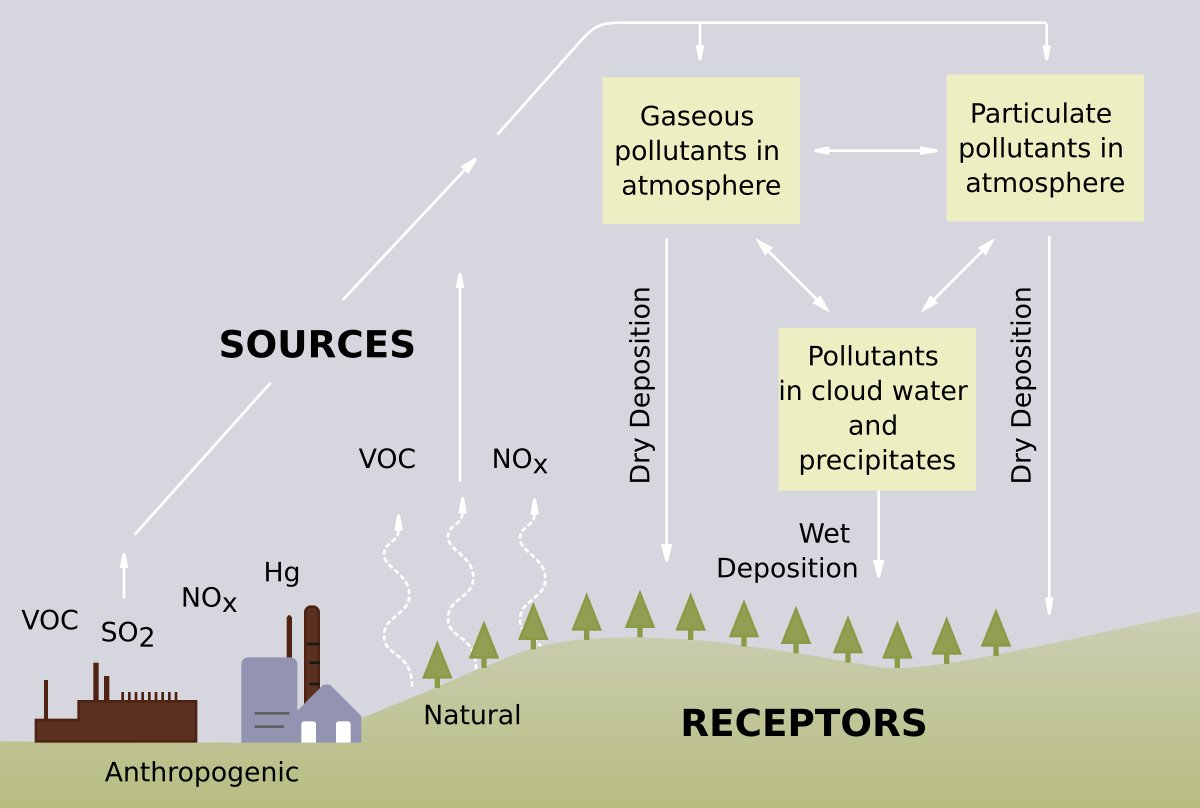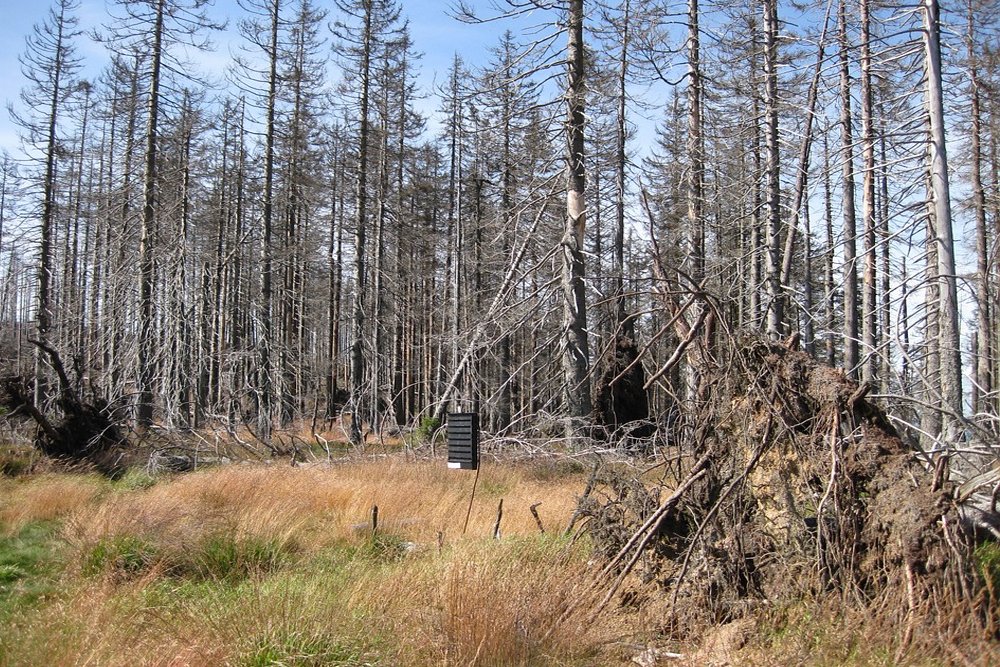This causes the pH of the water to drop below its usual neutral pH and results in causing destructive effects on different life forms such as plants, animals, etc. as well as the infrastructure. Both natural and manmade sources are responsible for acid rain. However, the recent human intervention in nature owing to industrialization has worsened the effects. So, is acid rain a strong acid? No, acid rain is not a strong acid. It is a weak acid having a pH value between 3 and 4 on the pH scale. The pH of acid rain is slightly lower in comparison to normal rain due to the formation of diluted sulphuric acid when rainwater reacts with atmospheric sulfur dioxide and nitric acid when it reacts with nitrogen oxides. The lowest pH value recorded for acid rain is about 2.5 which is comparable to lemon juice (pH = 2.3). The pH of normal rain is between 5 and 6 which is also slightly acidic due to the environmental carbon dioxide reacting with rainwater resulting in the formation of carbonic acid. A strong acid is a substance that causes the burning of human skin as soon as it comes in contact with it. However, this is not the case with acid rain. Therefore, acid rain is a weak acid. The acidity of any substance is determined through the pH scale that runs from 1 to 14. The acidic substances have a pH value below 7 while basic substances have a pH value above 7. The pH value for neutral substances is 7.
In this article, we will study acid rain in detail. Stay connected!!
Why is Acid Rain a Weak Acid?
The term pH refers to the “potential of hydrogen” i.e. the number of hydrogen ions present in that solution. The acidity of a solution is directly proportional to the number of hydrogen ions present in the solution i.e. as the concentration of hydrogen ions increases its acidity also increases simultaneously resulting in a decline in the pH of that solution. The normal rainfall is slightly acidic owing to the presence of carbonic acid that is formed by the combination of atmospheric carbon dioxide with water molecules as per the following reaction: CO2 + H2O —-> H2CO3 Carbonic acid is a weak acid due to which only a slight change in the pH value of water molecules is observed that changes from neutral (7) to slightly acidic (6). However, due to recent human activities, many other toxic gases are being added to the environment that reacts with water molecules to form stronger acids. The major acids that are responsible for acid rain are sulphuric acid and nitric acid. Both these acids are very strong having a pH value of around 1. Therefore, when these combine with the rainwater its pH value decreases multiple folds and reaches about 3 to 4 indicating that the hydrogen ion concentration has increased around 1000 times making it more acidic in comparison to normal rainwater and is referred to as acid rain. However, acid rain is still a weak acid. The reason for this is that sulphuric acid and nitric acid although very strong in nature are present in a very scarce amount in the rainwater. Hence, acid rain is actually a very dilute solution of these acids with a small number of hydrogen ions making it a weak acid.
What Acids are in Acid Rain?
Below are the main two acids present in the acid rain • Sulfuric Acid (H2SO4) • Nitric Acid (HNO3)
Sulfuric Acid (H2SO4)
Human activities are responsible for adding a number of unwanted substances to the environment. Acid rain is also the result of one such addition. It is caused due to the presence of various harmful gases in the environment such as sulfur dioxide and oxides of nitrogen. Sulfur dioxide is formed due to the burning of fossil fuels such as carbon in various industries such as thermal power plants, steel industries, and even domestic usage. Although this gas is already present in the environment owing to the dead and decaying plants and animals, the percentage composition is very low. Human intervention has increased this percentage multiple times resulting in a large amount of sulfur dioxide accumulating in the atmosphere. These sulfur dioxide molecules react with the water molecules that are present in the rain droplets and form sulphuric acid as per the following reaction: SO2 + H2O —> H2SO4
Nitric Acid (HNO3)
Another acid formed similarly which is also responsible for acid rain is nitric acid. The oxides of nitrogen are produced as a result of the burning of petrol and diesel in the hot engines of automobiles. As the number of vehicles has increased exponentially in the last decade the amount of nitrogen oxides released in the atmosphere has also increased to a large extend. At the time of rain these nitrogen oxide molecules react with rainwater and for nitric acid through the given chemical equation: NOX + H2O —-> HNO3 The sulphuric acid and nitric acid so formed fall on the earth along with the rainwater and are, therefore, responsible for causing acid rain.
What Causes Acid Rain?
The balance is the essence of nature. The natural rainfall is also acidic to some extent but nature has already provided means to neutralize that acid through alkaline chemicals that are found in soil, lakes, streams, etc. However, the increasing human intervention has disturbed the balance of nature. The rapid pace at which industries are being established or automobiles are entering the roads has resulted in mammoth level production of pollutants that are now beyond the reach of earth’s natural ecosystem’s neutralization capacity. This means that despite the hard work of the natural agents these pollutants are getting accumulated in the environment resulting in catastrophic incidents such as acid rain.
Acid Rain Cycle
The normal rain is formed through the natural water cycle in which the heat from the sun causes the water in the reservoirs such as oceans, rivers, and lakes to vaporize. These vapors rise high in the atmosphere where they eventually cool down to form small droplets. When many of these small droplets come together they fall back to the earth’s surface causing rain, a process known as precipitation. In the heavily polluted places, the smoke from the industries as well as automobiles mixes with the water vapors as they rise above the atmosphere. The pollutants such as SO2 and NOX combine with the rainwater thus making it acidic. This acidic water falls back on the earth’s surface as acid rain. SO2 from industries + NOX from automobiles + Water vapors from natural sources = Acid Rain (H2SO4 + HNO3 + H2O)
How does acid rain affect the environment?
Acid rain affects all the parts of the natural environment viz. soil, water, and plants as well as manmade things such as buildings, bridges, etc. However, the extent of damage caused varies from place to place depending on their environmental conditions.
• Soil Pollution
For example, some soils that are alkaline in nature neutralize the acidity caused due to acid rain on the other hand the soil that is already acidic may not be able to do so resulting in increased acidity of soil which may reduce the availability of various minerals such as Calcium, Magnesium, Potassium, etc. Some molecules such as ammonia (NH4+) also get dissolved under acidic conditions and may not remain available for plant consumption. The acid rain when falls in the water bodies such as lakes or rivers, may result in decreasing the pH of the water that can cause a decline in the health or even death of many aquatic animals which may not be able to sustain the acidic conditions.
• Effect on Buildings
Acid rain also poses a great threat to manmade structures. The most evident effects are seen on limestone and marble structures that form a part of most historical monuments. The acids present in acid rain can cause flaking, discoloring, or even damage the surfaces of such structures. One of the famous monuments Taj Mahal getting yellow color is one of the examples of the effects of acid rain.
• Corrosion of Metal
Also, as acids are corrosive in nature the acid rain can result in corroding various metal structures such as bridges, railways, etc.
• Water Pollution
The effects of acid rain may last for several generations due to the leaching of many unwanted chemicals into the soil and water bodies which may continue affecting the ecosystem adversely for a long duration of time.
How to Prevent Acid Rain?
Due to the extensive researches carried out on acid rain in the 1960s, the international governments started taking measures to control its effects after having realized the gravity of the situation. Certain technical measures are also adopted such as the flue-gas desulfurization (FGD) technique which is used in thermal power plants where coal is used to generate electricity. One example of the FGD technique is wet scrubbers that are installed in the towers emitting sulfur dioxide. These absorb about 95% of the SO2 emission by combining it with the calcium slurry injected in the tower and converting it into calcium sulfate. Some international treaties such as the Helsinki Protocol on the Reduction of Sulphur Emissions under the Convention on Long-Range Transboundary Air Pollution, Air Quality Agreement between the U.S. and Canada, etc. have been signed with a promise to bring emission of harmful gases under check. Other than these every individual may play a role in reducing the harmful effects of acid rain by cutting off the emission of pollutants on their part as far as possible as using public transport, switching off the engines on traffic signals, etc.
Conclusion
The pH value of normal rain is around 6 while that of acid rain is about 3 indicating that acid rain is about 1000 more acidic than normal rain. The acidity of acid rain is due to the presence of two acids viz. sulphuric acid and nitric acid formed by the combination of water molecules with sulfur dioxide and nitrogen oxides, respectively. Acid rain is weak acid as the strong acids involved in its formation are present in very dilute form. Industrial and automobile pollution is majorly responsible for acid rain. If you guys liked the article. Feel free to share and comment to motivate me so that I can publish more and more useful content for you guys. Thanks in advance!!



